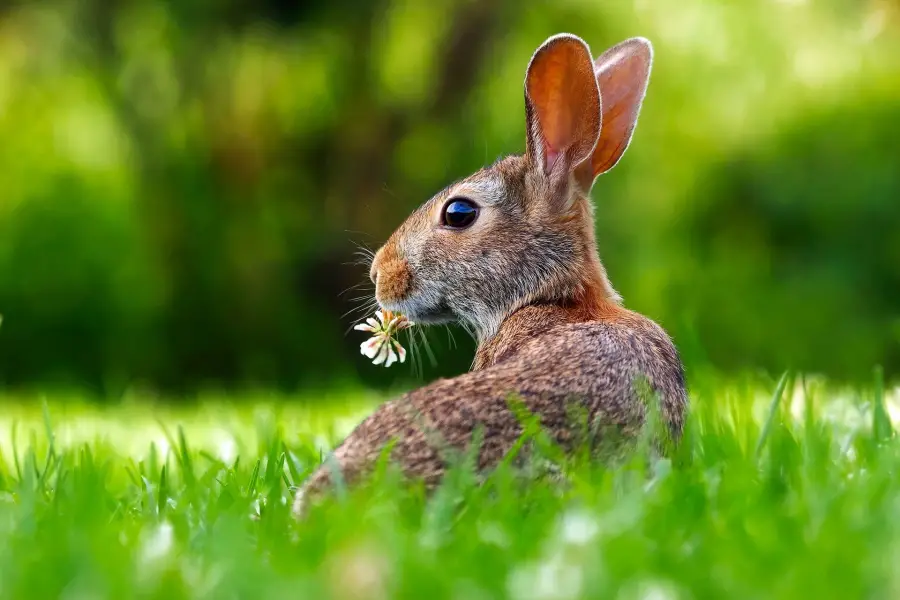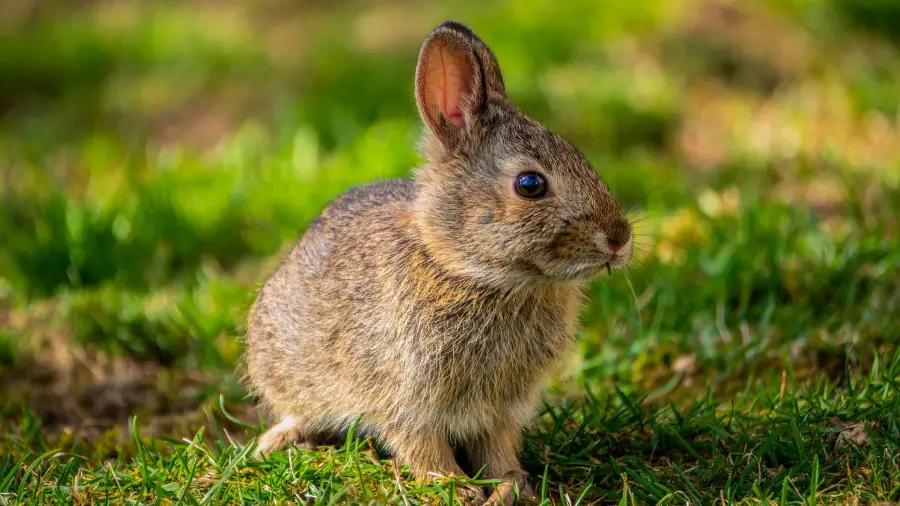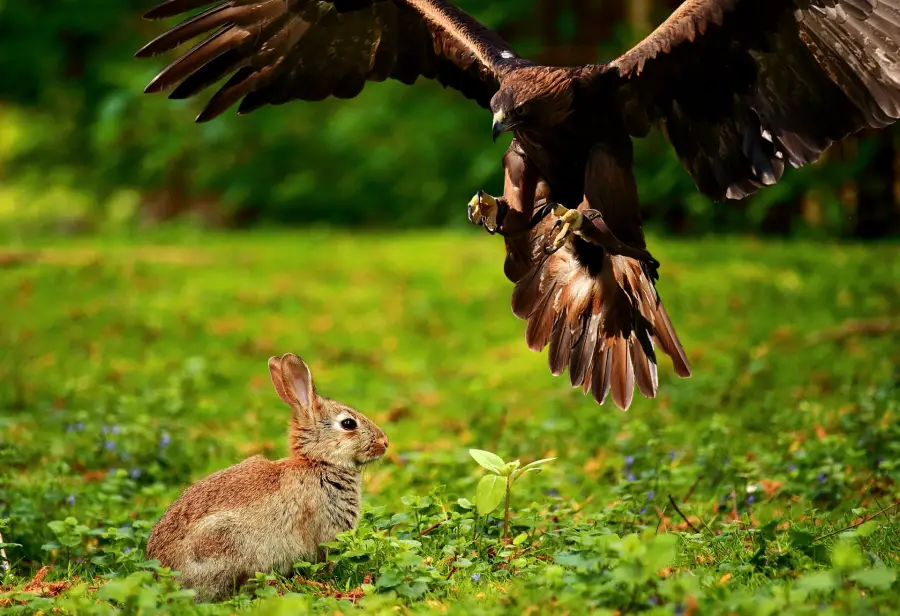Rabbits are some of the cutest and fuzziest animals you can have around your home. They are great fun for the whole family and are relatively hassle-free as pets in terms of maintenance and feeding. However, any vegetable gardener will tell you that wild rabbits can also turn into major pests because of their love of some vegetable plants.
So, do rabbits eat cucumber plants?
Rabbits definitely eat cucumber plants. They will nibble on the vegetable itself, but especially love to eat the cucumber leaves. They naturally like the low lying availability, taste, and instinctively crave the nutritional benefits they get from them like fiber, magnesium and vitamins C and K.
Today, we look at rabbits and their affinity for cucumber plants. We will take a look at the best ways of protecting your cucumbers from a full-frontal lagomorph assault. We also have a list of plants and vegetables that rabbits tend to avoid.

Contents
Do Rabbits Eat Cucumber Leaves?
Let’s start by stating that rabbits ABSOLUTLEY LOVE cucumbers and cucumber plants. Cucumber leaves are a particular favorite. Feeding cucumbers to your rabbits will boost their fiber, magnesium, and vitamin (C, K) intake.
Rabbits eat cucumber leaves and can safely do so every day. The signs that wild rabbits may be eating your cucumber leaves are fairly evident. The edges of the leaves will be jagged and there can be holes. If not curtailed, rabbits can devoid your cucumber plants of most of their leaves.
If you are wanting to feed a pet rabbit cucumber leaves, then you are on the right track. They love them and will eat several every day if available.
These lovable furry balls of cuteness will be content with several types of vegetation, but cucumber leaves can be an enjoyable staple in their diet.
How To Keep Rabbits Away From Cucumber Plants
However, problems may arise if you have vegetable beds with cucumber plants that are still developing…and free-roaming rabbits. The little munchkins can wreak total havoc on your garden and could completely ruin your crop for the season.
Luckily, there are a few interventions you can make to protect your cucumber plants from rabbits.
Mesh Fencing To Protect Cucumbers
The best solution is to make use of fencing and netting. We recommend a mesh fence that is about 2-3 feet tall and running right around the cucumber bed. Jackrabbits are known for their excellent jumping, so we strongly recommend a fence that is at least 3 feet high in areas they inhabit.
Rabbit Proof Netting And Wire Around Cucumber Plants
Netting can serve as a substitute for mesh wire. It is more flexible in certain applications and can be cheaper than wire. Due to its flexibility though, more support is needed to keep it from sagging and inviting our furry friends from hopping right over.
You can also use barbed wire, provided that the pattern or spacing between the wires isn’t too big. This is usually overkill since this is meant to deter larger livestock that tend to test perimeters with their weight against fencing.
Bunnies tend find small holes to slide through. It may be a challenge to weave stiff barbed wire tight enough to effectively deter the sneaky little guys.
Garden Bed Covers
You can also opt for garden bed covering. This option is not as permanent as a fence but it is still a good way of protecting young plants. Rabbits favor young plants because of their tenderness. Therefore, protecting young cucumber plants is essential.
Row covers are usually made of fabric or plastic. Each material has its own set of pros and cons, but both will be equally effective in keeping rabbits away from your young cucumber garden.
We recommend using row covers during the early development phases of your plants. However, since this isn’t a permanent solution, you might want to erect a fence before the plants reach maturity.
Using Technology To Keep Rabbits Away From Cucumber Plants

Technology has also presented an ethical way of keeping rabbits out of your garden…electronic animal repellants.
These devices emit high-frequency (or ultrasonic) noises to drive away animals like raccoons, deer, squirrels, rats, foxes, and, of course, rabbits. Modern iterations of these devices use motion detection to trigger the high pitched noise. Some adult humans may not be able to catch the noise, but children and animals with sensitive ears can hear it.
Most manufacturers create devices that can either be staked into the ground or mounted upon a wall or tree. So, if a rabbit (or several) wanders near your plant bed, the device will detect the motion and start making the noises until the disturbing presence moves out of range. Over time, the rabbits will learn to avoid your cucumber beds altogether.
These sound solutions work for some areas better than others. Essentially you are training area rabbits not to enjoy entering your garden. The problem comes with stubborn bunnies, specific breeds, and each year having to ‘retrain’ a new crop of hungry fuzzballs.
To read more articles you will like from me at LawncareGrandpa.com, click on one of these links…
- What Is Eating My Strawberries? Let’s Find Out!
- Do Squirrels Eat Grubs In Your Lawn? Moles, Birds, Etc
- Is TruGreen Safe For Pets? (Explained)
Do Coffee Grounds Keep Rabbits Away?
Organic rabbit repellants can also be incorporated. Some rabbits can be deterred by eggshells, banana peels, and even coffee grounds that are laid around garden beds. Ground-up black pepper is also known to drive rabbits away.
Coffee grounds and other organic, natural solutions to keeping rabbits away from garden vegetables and plants can work in theory, but have even a less chance of actually working than sound based deterrents. Some bunnies may not like coffee grounds, but others will just ignore them.
According to PBS.org there are upwards of 29 species of rabbits found on every continent other than Antarctica. Though you will not have most of these in your area, every zone will be more or less desirable to specific types. Some will be more sensitive to smells and others to sound.
To control your particular bunny population with solutions other than physical barriers, trial and error will be your main course of action. If you are wanting to add some of these natural deterrents along with fencing or covering, then it may lead to them working a bit better.
Other Natural Bunny Deterrents
There are also a lot of flowers and plants that you can grow around your vegetable beds as a deterrent. While rabbits eat a wide variety of vegetation, several species are unappetizing or toxic to them. These can also mask the smell of your garden vegetables.
You can also use the rabbit’s natural instincts against them. Rabbits are always on high alert for predators, and any trace of one is likely to send them scurrying. Dog and cat hairs or even urine can be placed in and around cucumber beds. Rabbits have a keen sense of smell so the odors may be enough to drive them away.
Decoys Can Save Cucumber Plants From Hungry Rabbits

You can also introduce a scarecrow of sorts. We recommend one that is shaped like an owl. Needless to say, rabbits are not fans of birds of prey. Amazon has a wide number of decoy owls that can do the trick, with some even having rotating heads and realistic sounds!
I know in my yard we have a lot of squirrels, bunnies, and chipmunks. They are very alert and to the chagrin of a couple of local hawks, they figure out quickly what is a threat and what is not.
When a hawk appears in a nearby tree or circling above they will stay near trees or other cover, but keep foraging. The only time I have seen all of the furballs disappear at once was when one of the hawks had swooped down trying to snatch one.
The funny thing was, seconds after the hawk flew back up and out of sight, the frantic foraging continued as if nothing had happened. All of these small animals quickly get used to what is a threat, when danger is around, and when the coast is clear.
Scarecrows and decoys may work for a period, but rabbits are smart and they may eventually work out the ruse.
Rabbit Repellants For Cucumbers
A lot of companies have also begun producing chemical repellants for garden invading rabbits. Chemical sprays such as I Must Garden Rabbit Repellent are some of the choices available from Amazon online.
I Must Garden Rabbit Repellent, in particular, is a rabbit-friendly formula that contains extracts and oils from plants that rabbits avoid naturally. Its minty scent is refreshing for humans but it is a deterrent for rabbits. Simply spray the product on the plants you wish to protect. When rabbits try to nibble your cucumber plants, they will encounter a very bad taste and steer clear.
DIY chemical repellents are also an option. If you have extra bars of scented soap, for example, you can make homemade rabbit repellant. Cut the soap into little cubes and place them in old socks. Place the socks around the garden and the smell of the soap should keep rabbits away.
Another DIY solution is to mix water and Tabasco sauce. The resulting solution can then be sprayed onto the cucumber plants. This will give the plants a bad taste and discourage the rabbits from causing further damage. We have even done this for indoor cats that like to chew on potted plants.
Physical Solutions To Protect Cucumber Plants From Rabbits
We also recommend that you clear the environment around your veggie bed of potential rabbit hiding places. Compost heaps, tall grass, and even sheds can serve as a refuge for invasive rabbits.
You can also use strategic feeding to protect your garden. This can be done by placing rabbit pellets as far away from the garden as possible. By the time they stumble upon your cucumbers, the rabbits will be too full to cause any major damage.
What Vegetables And Plants Do Rabbits Not Eat?
As we’ve already mentioned, rabbits eat a lot of flowers and vegetables.
But they do not eat all of them. Various vegetables and plants are not on rabbits’ menus because of taste or toxicity. Some of these may repel rabbits, but some they will just skip in a garden and head to their preferred meals… like cucumbers.
Believe it or not but rabbits tend to avoid:
- Tomatoes
- Asparagus
- Onions
- Potatoes
- Squash
- Leeks
As far as flowers and herbs, rabbits will not eat:
- Lantana
- Basil
- Oregano
- Wax begonias
- Geraniums
- Cleomes
- Parsley
- Tarragon
Again, these may not deter rabbits from entering a garden, but it could happen if enough of them are around the perimeter, fooling them into thinking there are not tasty treats in the middle. That being said, I doubt it. These little guys are pretty smart and very determined.
If you are raising rabbits, this is a good list of things to avoid trying to feed them. Some of them are not tasty to a bunny and some can be toxic at least on some level. Avoid them as bunny food for those little ones you want to keep around.
The Final Touches On Rabbits Eating Cucumber Plants…
There you have it! Bunny rabbits love to each cucumber plants, their leaves, and the vegetables themselves. The problems come when these are not pet rabbits, but wild ones looking to munch on your cucumber crop.
There are many ways to deter rabbits, but it may take some trial and error to figure out how to best dissuade your particular bunny population. Not all rabbit species are the same and some solutions work better then others depending on which type you have around your home and garden.
We love the little guys that live and munch around our house. We have mostly herbs and some small vegetable plants so our solution is to keep them on raised planting tables. This deters most of the fur balls including bunnies, chipmunks, but not those pesky squirrels. But, they are a subject for another article.
More articles just for you…
- Plants That Look Like Mint But Aren’t (Revealed)
- What Color Greenhouse Should I Choose? (Revealed)
- What To Do About Tomato Plant Leaves Drying Up
References
https://www.backyardgardenlover.com/how-to-keep-rabbits-away-from-the-garden/

